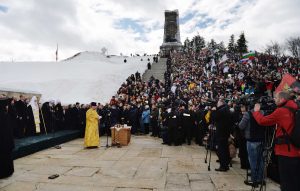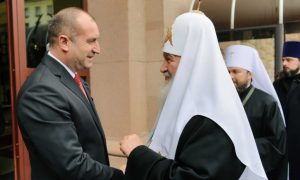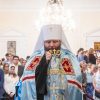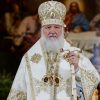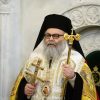The Lord, having gone up to Jerusalem and visited the holy place of the people of Israel, the Jerusalem Temple, returned to Bethany in the evening. On Monday He again went to Jerusalem and we know what kind of chastening words He spoke to the Pharisees, chastising their hypocrisy. In the evening, the Savior again went to Bethany, to the house of Lazarus, where He spent the night. On Tuesday He returned to Jerusalem.
The first days of Holy Week are marked by the special power of Christ the Savior’s words. Although during these days He often speaks in parables, these parables are very purposeful. They help people understand the most important thing: what awaits them, what their fates are, what lies ahead, and how to live in order to enter the Kingdom of God.
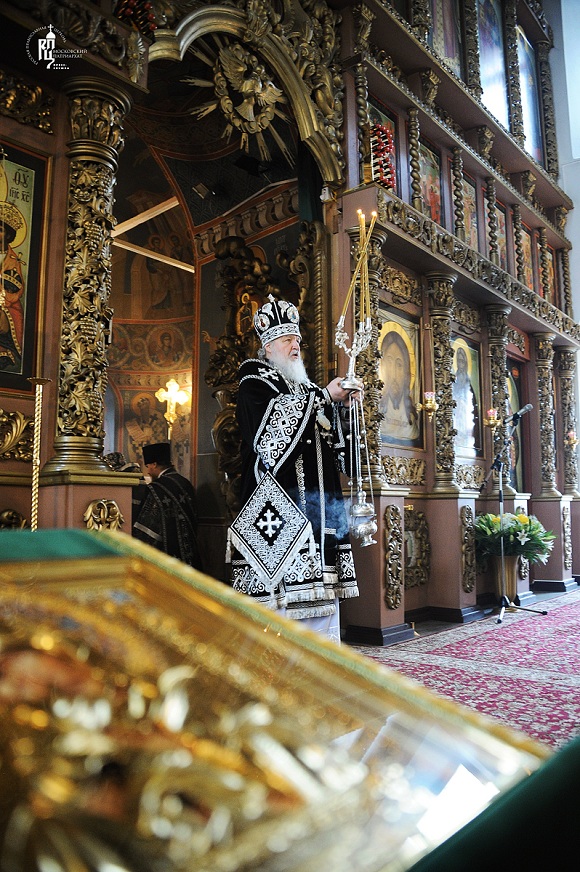
Patriarch Kirill celebrating the Liturgy of the Presanctified Gifts
The theme of Great Monday continues today: that of judgment. God’s Judgment, the Dread Judgment – these are different ways of calling what awaits each person and all humanity, all generations, all peoples, and all nations. The meaning of this event, which is mysterious to us, is somewhat revealed by the words spoken by the Savior on the Monday and Tuesday before His suffering.
God’s great judgment is the lifting of all masks, of all false appearances, of everything that man tries to create to form a positive image. We will all stand exposed before God, in the sense that everything false and affected that has become part of our life, intentionally or accidentally, will be removed and destroyed. The truth about our life will be illumined by the power of Divine truth. The parables spoken by the Lord on Tuesday of Holy Week help us all to understand what will take place at the very moment we stand exposed before God (cf. Matthew 24:36-26:2).
Of the three parables dedicated to the theme of judgment that we heard today, the parable of the ten virgins – five wise and five foolish – occupies a special place. The lamps that these virgins held in their hands are an image of the human soul: at least, this is how the patristic tradition interprets this Gospel text. What does having oil in the lamp mean? What does having an empty lamp mean? If the lamp is an image of the soul, then does that mean that the human soul is actually empty? Even if one has not believed in God, even if one has done nothing good in the sight of God, is not the soul still filled with something? We receive some kind of education and upbringing, which form a certain cultured or uncultured image of man – although now all this has become mixed up and there is no sold and clear criterion that would distinguish one from the other. But, in the end, we have our achievements. Some climb the ladders of power, others acquire great wealth and economic power, and many achieve worldly rewards for their activity. Does not all this fill the soul? Does not all this enter one’s inner life? Yes, this undoubtedly enters and forms one’s image. Then why is none of this considered and recognized as being of value before God? Yet this is not the oil that feeds the lamp, allowing it to be kindled upon meeting the Bridegroom. This means that none of what we most often refer to as values and achievements, to which our lives are dedicated, are of value before God.
In order to understand what we are talking about, it is best to cite a concrete example from life. I will venture to give an example that is far removed from the spiritual life, but that is understandable to modern man. Imagine that you have to pay for goods in a store. You open your wallet, the cashier stretches out the bill, and says: “We don’t accept these bills. They’re valueless. Maybe we did once, but we don’t accept them anymore.” So, these “values” that we create over the course of our entire lives are like a bill that cannot be accepted for payment. It is nothing before the face of God, nothing from the point of view of Divine judgment. Then perhaps everything is valueless and in vain do we study, receive an education, have a career, or achieve some kind of success in life?
But the Lord never and nowhere condemned man for acquiring human power, be it intellectual, political, or economic. The Lord never and nowhere said: you do not need to have material values, you do not need to strive for power, you do not need to receive an education. He never and nowhere said any such thing. It is simply that these values cannot be submitted at God’s judgment as justification for one’s life. One can only submit those values of which the Lord spoke in another parable: Have you fed people? Have you given them something to drink? Have you visited them? Have you shared their suffering? That is, those good deeds in which we sacrifice ourselves for another person. Incidentally, these deeds can be combined with professional, political, economic, and social activity, when one uses one’s power for doing good for others. Perhaps one does not literally visit inmates in prisons or patients in hospitals, but one does gives one’s life – whatever one has – to other people.
This is what God seeks; this is what will be accepted as justification for our sins. We should understand clearly that the only thing that saves us is a life, permeated by Divine grace, that aims to share what one has with other people. Good deeds should be at the center of life, and good deeds always require sacrifice from us, the ability to smother one’s own voice, to limit one’s needs and ambitions, and to give others a portion of what one has by various ways and means. This is what fills the soul with the oil that allows it to be kindled upon meeting the Bridegroom.
The foregoing does not apply only to our personal lives, although it does apply to them in the first place. After all, if this is the right way for a person to live, then it is likely how human society should live as well. If consumption values are formed in society – to have as much as possible, while good deeds are forced to the periphery, forgotten, trampled upon, or given over to ridicule – then this is emptiness, this is a lamp in which light will never be kindled.
The parable that we heard is of great significance for understanding the future world and man, for understanding our personal lives in the future age. It is no accident that these piercing words of the Savior, which tell us with such crystal clarity how we should live and what we should do, are spoken in the days leading up to His suffering. Imbued with the meaning of these words, and immersed in the depths of the Church’s rich liturgical life during these days, let us strive to take from them what may be the most important lesson in our lives, the lesson that will form the required vector for our aspirations in life and determine the direction of our personal and – by God’s mercy and with our joint efforts – social being. Amen.
Delivered on April 10, 2012, during the Liturgy of the Presanctified Gifts in the Church of St. Sergius of Radonezh in the Vysoko-Petrovsky Stavropegial Monastery in Moscow.













